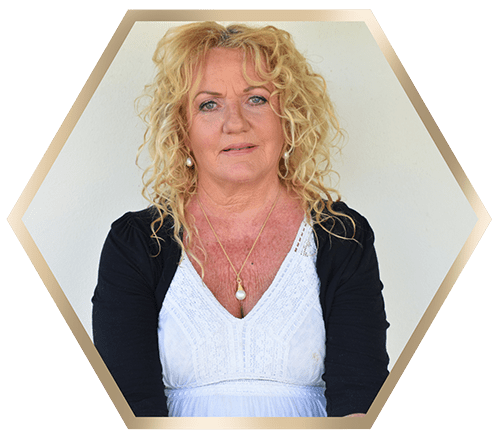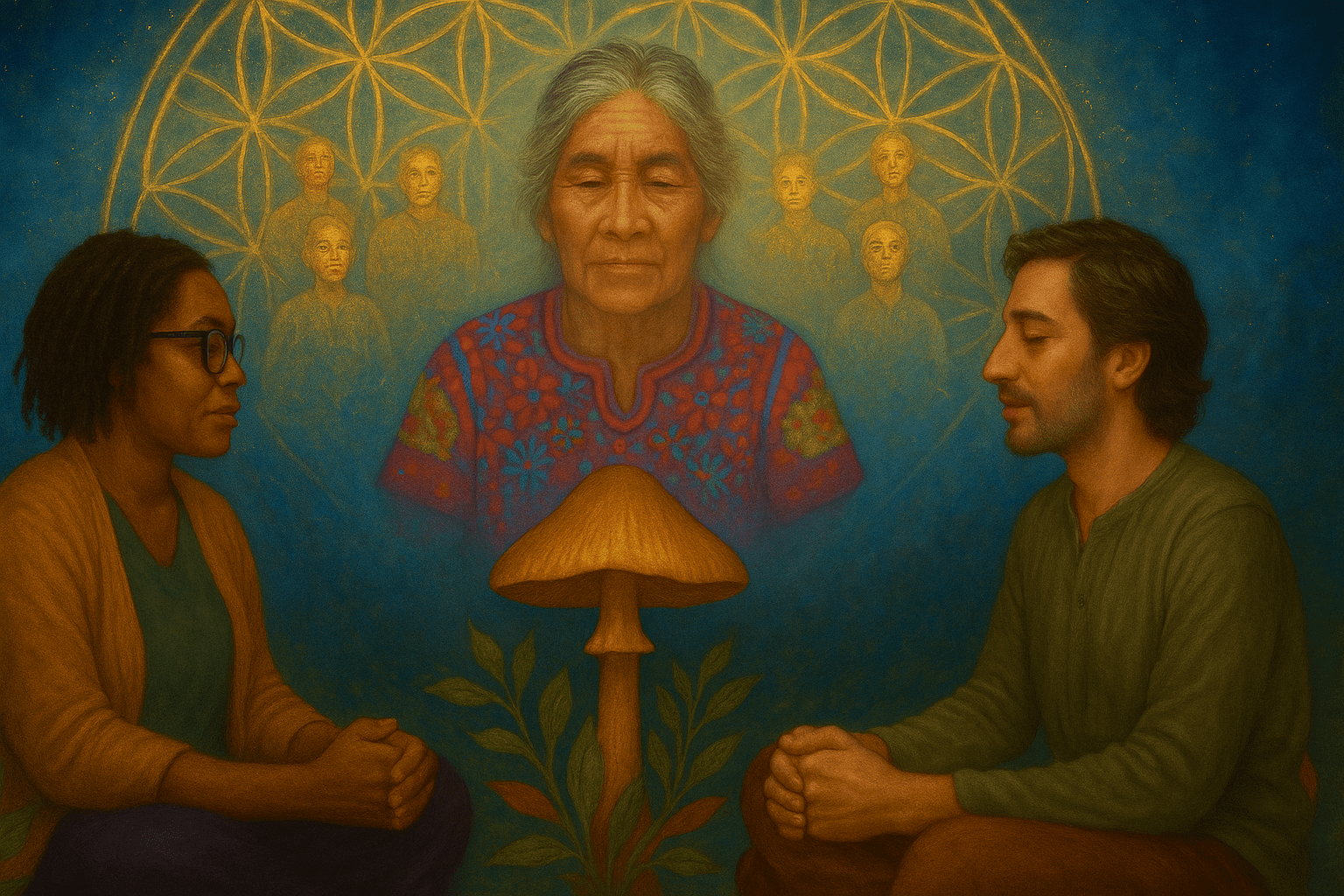Ancestral trauma is one of the most profound layers of trauma a client may encounter during a psychedelic experience. Beneath the personal stories and visions, many people begin to sense the weight of inherited pain – emotional patterns passed through their bloodlines, shaped by history, migration, war, silence, or separation.
For plant medicine practitioners and integration coaches, supporting clients in navigating ancestral trauma requires more than insight; it demands a trauma-informed framework, cultural humility, and a deep respect for the sacred nature of this work. Psychedelic integration becomes a space not just for personal transformation, but for generational healing.
Why Psychedelic Healing Often Brings Up Ancestral Trauma
Psychedelics have a unique capacity to dissolve the ego and open the field of consciousness beyond the self. In these altered states, clients may find themselves revisiting not only their own experiences but also those of their ancestors. These remembrances of ancestral trauma are experienced in the entheogenic journey through visions, emotions, bodily sensations, or archetypal imagery.
This phenomenon isn’t just symbolic or an aspect of the journeyor’s imagination. Fields like epigenetics and trauma psychology confirm that unhealed trauma can be passed down generationally, influencing everything from stress responses to behavioral patterns. Plant medicines often surface these buried layers, offering an opportunity to witness and release what’s been carried unconsciously. And awareness of inherited pain can initiate powerful change.
“If you understand small aspects of such patterns, it can already move mountains and completely change your life.” ~ Dr. Regina Hess
“For integration coaches, recognizing when ancestral trauma is in the room means paying attention to language like “ this feels older than me,” or “I don’t know where this grief is from.”
These are invitations to slow down, to listen deeply, and to create a safe container for the story to unfold.

Ready to guide clients through ancestral trauma without feeling uncertain or unequipped?
Join Ancestral Healing and Ancient Wisdom: A Trauma-Informed Framework for Plant Medicine & Psychedelic Integration and learn from Dr. Regina U. Hess how to hold sacred space for inherited wounds using trauma-informed tools, ancestral wisdom, and somatic integration practices.
Trauma-Informed Therapy as a Pathway to Generational Healing
Trauma-informed therapy is essential when working with ancestral trauma. Trauma-informed therapy is an approach that recognizes the widespread impact of trauma and understands the potential for recovery. It emphasizes creating a safe and supportive environment, understanding trauma responses, and tailoring treatment to address the unique needs of individuals with trauma histories.
Experiences of ancestral trauma often live in the body as implicit memory – deep emotional or somatic responses without a clear narrative. A trauma-informed approach prioritizes safety, choice, and attunement, allowing clients to explore this material without retraumatization.
How might it be possible for psychedelic integration providers to work with clients who are remembering ancestral trauma and transform it into a pathway to liberation?
Dr. Regina U. Hess, a clinical psychologist and transpersonal researcher, guides this work with decades of global leadership in psychedelic healing.
It’s important to understand that the work of healing ancestral trauma isn’t about analysis or diagnosis. It’s about helping clients witness what they’ve inherited with compassion. Integration coaches hold space not by offering interpretations, but by gently supporting the client’s discovery process through body awareness, reflection, and emotional regulation.
In trauma-informed psychedelic integration, the goal is never to “fix” the past. It’s to help clients become conscious of it, feel its impact, and make new choices that honor both the pain and the resilience of their lineage.
Honoring Cultural Roots and Complexity in Ancestral Work
Working with ancestral trauma through plant medicines requires cultural humility and ethical awareness. Many entheogenic medicines – such as ayahuasca, psilocybin, and iboga – originate from Indigenous traditions where connection to ancestors is experienced as a living relationship, not merely a metaphor.
💡”For integration coaches, honoring the spiritual and cultural dimensions of ancestral work is essential to healing ancestral trauma. This is because clients may experience ancestral guidance, visitations, or rituals during or after ceremonies. Others may grieve cultural disconnection or carry the burden of historical injustice. Each of these responses is valid and must be received with presence, not pathology. The connection to ancestors is foundational.
“Without our ancestors, we would not be here, and I hold the torch as elder grandmother now to support that connection, that reconnection.” ~ Dr. Regina Hess
Cultural respect means not collapsing these experiences into Western psychological language or rushing to assign meaning. It also means acknowledging collective traumas – such as colonization, war, or forced displacement – that have shaped entire communities and continue to affect descendants today.
Practitioners must also examine their relationship to ancestry, privilege, and culture. When integration coaches engage in their generational healing, they’re better able to hold space for others without projecting, appropriating, or bypassing. Cultural respect is not a concept – it’s a daily practice of listening, unlearning, and honoring complexity.
Psychedelic integration is the bridge between insight and embodiment. When ancestral trauma surfaces, it calls for a kind of listening that is slow, reverent, and attuned to more than the individual. As coaches and guides, we have the opportunity to support not just the client in front of us, but the many voices, stories, and spirits that travel with them.
Healing generational trauma begins with awareness. When clients begin to understand that the pain they carry may not be theirs alone, they can also begin to choose what they carry forward. In this way, psychedelic healing becomes an act of remembrance, release, and reclamation.

Ancestral Healing & Ancient Wisdom: A Trauma-Informed Framework for Plant Medicine & Psychedelic Integration
Are you a psychedelic practitioner seeking a deeper, more embodied approach to integration? One that honors ancestral healing and ancient wisdom within a trauma-informed framework?
This workshop bridges ancient wisdom with modern science to help you integrate plant medicine experiences with clarity, compassion, and integrity. Learn to support personal, collective, and planetary transformation through grounded, somatic practice
What You’ll Learn
🌿 Integrate plant medicine and psychedelic experiences through trauma-informed, somatic, and ancestral healing principles.
🌿 Apply movement, sound, and creative expression to anchor expanded states into lasting transformation.
🌿Understand transgenerational, transcultural, and ecological trauma, and how to address these layers in psychedelic-assisted work.
About the Facilitator

Regina U. Hess, Ph.D. (Netherlands/Portugal), is a clinical psychologist from Germany and holds a joint Ph.D. in transpersonal psychology (USA/UK).
Regina is the visionary founder/director of Birthing an Ancient Future – Multidisciplinary Council of Peace-Builders, bridging ancient wisdom traditions and modern (psychedelic) science, a global initiative offering events, retreats, and different educational programs, Stewards of a New Earth.’ Regina is a faculty member at international universities such as the Alef Trust, UK, and psychedelic educational institutes, e.g., BmedGlobal, and is an independent researcher. Dr. Regina U. Hess is on the Board of Directors of the EUROTAS Global Transpersonal Network and the International Transpersonal Association and is Vice President of the European Transpersonal Association (ETPA).

